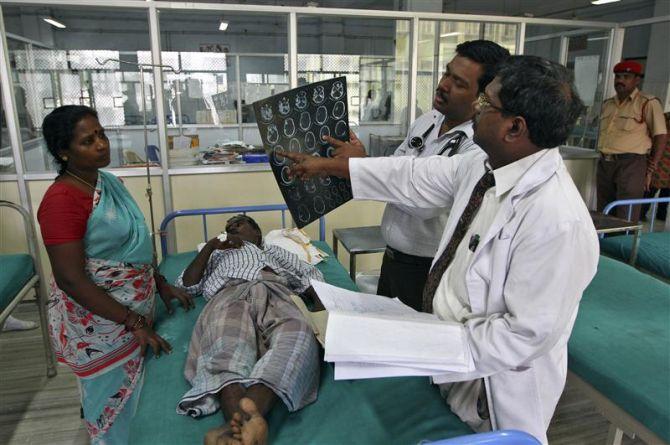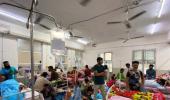'The first duty of the government is to learn lessons from a bad experience and course correct. It's a pity that the government is making policy without looking at evidence and differentiating between immediate and urgent.'

Eyebrows were raised after Union Finance Minister Nirmala Sitharaman in her Interim Budget ahead of the general elections of 2024 allocated Rs 3,712.49 crore (Rs 37.12 billion) for Ayush ministry -- which was more than the fund allocated for department of health research, which got Rs 2,980 crore (Rs 29.80 billion).
The move was criticised by many health experts as they felt that post COVID, India needed more money for health research on vaccines rather than spend on the Ayush ministry which promotes Ayurveda, Naturopathy, Unani, Siddha, Homeopathy and Tibetan medicine.
So what has the Modi government achieved in the health sector in the last ten years, what could it have done more, and and where has it failed?
In an e-mail interview with Syed Firdaus Ashraf/Rediff.com, retired Union health secretary K Sujatha Rao says, "The Covid pandemic once again showed up the serious deficiencies. Yet we continue window dressing.'
On Budget day you tweeted: 'Who was the budget's beneficiaries? No jobs, no education, no health care.' This at a time when Rs 89,155 crore has been earmarked in the Budget which is for health expenditure which is up by Rs 12,000 crore compared to last year.
Is Rs 89,155 crore not good enough for the health sector in the budget?
India's public spending on health is one of the lowest. For decades we have been asking for a massive revamp in spending priorities so health can get at least 2.5% to 3% of GDP as against the current level of 1.2%.
So incremental increases in current prices is window dressing, more so if you assess this nominal increase in real terms. That despite the devastating experience of Covid we still do not care about health is disturbing.
Health expenditure was Rs 31,536 crore in 2014-2015 and it was raised to almost three times to Rs 89,155 crore this year. Do you feel we as a nation headed in the right direction in the health sector? What more do we need to do?
No. Issues that finance ministers in their Budget speeches flag for special mention, reflect the government's thinking and priorities. And what were flagged? Vaccines for cervical cancer, Establishing 12 more AIIMS and covering front line workers under PMJAY.
None of these in any way address the gaps, cracks and shortcomings in our health system as exposed during the Covid pandemic that cost us so many lives.
The first duty of the government is to learn lessons from a bad experience and course correct. It's a pity that the government is making policy without looking at evidence and differentiating between immediate and urgent.
Apurva Chandra was appointed as health secretary two days ago, before that India was without a health secretary for weeks even when COVID has not fully ended.
Is not having a health secretary not unusual? Were there any ramifications since India had no health secretary for more than a month?
The health secretary is the captain of the ship. If there is no captain of a ship sailing on choppy waters, you can guess what the crew and passengers must be feeling.
Developed countries spend 10 percent of their budget GDP on health while we only spend 1.2 percent on health. Why is health never important to the Indian government? And why are people not aware that more needs to be spent on this sector?
It is not true that people are unaware and do not care. If you see the resonance that Mr Kejriwal (Delhi Chief Minister Arvind Kejriwal) gets due to the mohalla clinics, you will realise how important health is to the people.
But our governments have unfortunately not bothered as the rich and privileged are able to access corporate hospitals and our leaders can go abroad for treatment. So the ruling elites have their own schools, hospitals and so are not really concerned about the plight of the common man.
And this has been the sad story for the last five decades. The current government is no exception. For example, in the UK, no matter how powerful, all have to go through the NHS (National Health Service).
Of the Rs 89,155 crore budget outlay only Rs 2,980 crore has been earmarked for the department of health research whereas Rs 3,712.49 crore has been earmarked for the AYUSH ministry. This move has come for criticism from those who feel the AYUSH ministry does not deserve this kind of money. Do you agree?
I don't agree. Ayush has a lot to offer and I am glad the government is giving it much needed priority.
But then it is not a competition. Health research badly needs doubling of its budget and it's high time that it is given a huge step up. Depending on private research is not enough. Public funded research is critical if you look at global experience. Unwise to neglect that.
Proponents of AYUSH say that in the last two years, India exported AYUSH and herbal products worth $1,240 million which is a very significant amount. Does it mean we as a nation never paid much attention to these things and were heavily dependent on allopathy, thus neglecting our traditional herbal knowledge?
To a large extent, yes. Good that Ayush is doing well. It has its own strengths and limitations. Must play on its strengths and not look at it as a substitute to allopathy.
India has shown the world that when it comes to the health sector we could eradicate polio and successfully contained HIV/AIDS.
What are the areas that you feel that India needs improvement and which diseases must we take on as a government policy for the better health of all Indians?
It's very distressing that we are still unable to get a grip on TB, eliminate leprosy and reduce vector-borne disease incidence.
What we certainly need to do is to revamp our primary health care system and bring in a range of reforms to ensure access to good health care and reduce out of pocket expenditures. Merely increasing the sum assured under PMJAY is not enough. Health is far more complicated than that.
How has AYUSH (Ayurveda, Naturopathy, Unani, Siddha, Homeopathy and Tibetan medicine) fared ever since it has come to existence in 2014?
I don't know much as I haven't tracked, but I would not at all be surprised if it has done well and got stronger. I do believe Ayush has a lot to offer. Yoga, for example, is getting increasingly accepted by all.
The issue is maintaining quality while scaling up. That said, it can never be a substitute for allopathy and modern medicine. It has limitations that we need to recognise.
How will you rate 10 years of the Modi government from a health budget perspective?
I rate it to be as bad or good as all the predecessor governments. I look at 10 years as wasted as between the National Commission for Macroeconomics and Health and High Level Expert Group reports, the agenda for reform were spelt out and it was known what needs to be set right in our ailing system.
The Covid pandemic once again showed up the serious deficiencies. Yet we continue window dressing.
That said, I am thankful that the past good work has been consolidated and not destroyed. But we have the capacity to do much much more.
In terms of building new hospitals and adding more doctors, has the numbers improved or deteriorated in the last 10 years when you compare patients/doctor or patients/hospital ratio?
Medical colleges have doubled. Doctor availability therefore has improved.
With no data being put in the public domain, difficult to say, but by and large I am sure things have improved as new hospitals are getting built and upgraded and we have now a nurse in all previous sub-centres that are now called Arogya Mandirs. Many states like Andhra Pradesh have taken proactive action in deployment of personnel and etc.
But as I said, incremental improvements will not be enough. We need a massive injection of resources and policy response to get our health system achieve the standard goal of all health systems: A system that is accessible, affordable, appropriate and of good quality.
I would add that it is very urgent to take a more serious view of healthcare as our vulnerability to infectious outbreaks is high and going to get worse on account of the interaction between climate change and haphazard development that in several places disturbing the balance between nature and human habitat; demographic shifts; global push pull factors etc.
We have huge opportunities, challenges and risks. What we need is to understand the increasing complexities and move away from simplistic solutions that sound nice, but are inadequate.










